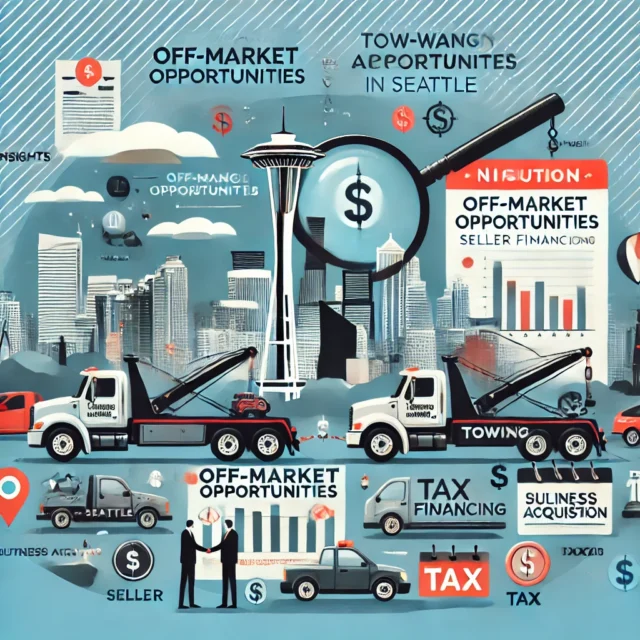As an advisor to entrepreneurs through acquisition (ETA) with experience in numerous deals, it’s clear that not every opportunity pans out. A recent situation in Seattle perfectly illustrates the challenges and lessons from failed towing company acquisition. Let’s explore this experience and the key takeaways that can benefit anyone looking to buy a business, especially in the towing industry.

Table of Contents
The Hunt for a Towing Company
Casting a Wide Net
The journey often begins with an ambitious plan: contacting all towing companies in a specific region. In this case, the target was 487 towing companies in Seattle. This methodical approach to finding off-market towing companies for sale is time-consuming but necessary. The towing industry is notoriously difficult to penetrate, with many owners reluctant to sell their hard-built businesses. To give an idea of the scale of this undertaking, here’s a breakdown:
- Research: Spend about a week compiling a comprehensive list of towing companies in Seattle. This involves scouring online directories, industry associations, and local business listings.
- Data organization: Create a spreadsheet with company names, contact information, and notes on each business. For Seattle, this might include details like service areas (e.g., downtown, Bellevue, Tacoma) and specializations (e.g., heavy-duty towing, roadside assistance).
- Outreach strategy: Develop a script for cold calls and a template for follow-up emails. Tailor these to address specific Seattle market conditions, such as the challenges of operating in a city known for its traffic congestion and hilly terrain.
- Execution: Dedicate 4-6 hours each day to making calls, averaging about 30-40 calls per day. The Seattle market may require more time per call due to the need to navigate through gatekeepers and address specific local concerns.
Tip: When searching for off-market deals, persistence is key. Don’t be discouraged by initial rejections, especially in a competitive market like Seattle. During the outreach process, expect to encounter a range of responses:
- Outright hostility: “F*** YOU, WE ARE NOT FOR SALE!” (about 25% of responses)
- Polite consideration: “We hadn’t thought about selling, but let’s talk.” (about 20% of responses)
- Gatekeepers: Some calls never make it past the receptionist. (about 35% of calls)
- No answer or voicemail: (about 20% of calls)
Dealing with Rejection
Facing rejection is an inevitable part of the process when finding off-market towing companies for sale. Here are some strategies to stay motivated:
- Set daily goals: Aim for a certain number of calls each day, regardless of the outcomes. In Seattle, this might mean targeting 30 quality conversations per week.
- Celebrate small wins: Even getting past a gatekeeper is progress. In a close-knit business community like Seattle, each positive interaction can lead to valuable connections.
- Learn from each interaction: Refine the approach based on the responses received. For example, you might discover that Seattle towing company owners are particularly concerned about the impact of tech companies on traffic patterns and adjust your pitch accordingly.
- Take breaks: Regular breaks help maintain a positive attitude. Use this time to explore Seattle’s vibrant coffee scene or take a quick walk in one of the city’s many parks.
The Breakthrough
After a month of relentless calling, a breakthrough often comes from an unexpected source. In this case, a broker connected the buyer with an off-market deal in the Ballard neighborhood of Seattle. This opportunity highlighted the importance of networking and using multiple channels to find potential acquisitions.
Lesson 1: Don’t rely solely on direct outreach. Cultivate relationships with brokers and industry insiders who can provide leads on off-market deals.
To maximize chances of finding off-market towing companies for sale in Seattle, consider these additional strategies:
- Attend industry conferences and trade shows, such as the annual Northwest Tow Expo.
- Join local business associations like the Puget Sound Towing Association or the Seattle Metropolitan Chamber of Commerce.
- Network with lawyers and accountants who specialize in business transactions in the Seattle area.
- Utilize social media platforms like LinkedIn to connect with industry professionals in the Pacific Northwest.
- Consider direct mail campaigns to complement phone outreach, targeting specific Seattle neighborhoods or suburbs.
Evaluating the Opportunity
The Initial Meeting
Upon connecting with an owner, arrange an in-person meeting to tour the towing yard and learn more about the business. This step is crucial in valuing a towing business for acquisition. Here’s what to look for:
- How long has the owner run the business? In Seattle’s dynamic economy, longevity can be a strong indicator of resilience.
- Does the owner own the land the business operates on? Given Seattle’s high real estate prices, this can significantly impact the deal’s value.
- What lifestyle does the owner enjoy? (This can indicate profitability and work-life balance in the Seattle market)
During the tour, be sure to observe:
- The condition of the towing equipment, particularly its ability to handle Seattle’s varied terrain and weather conditions.
- The organization of the yard, considering space efficiency in Seattle’s tight real estate market.
- The interaction between the owner and employees, noting the company culture and team dynamics.
- The overall cleanliness and professionalism of the operation, which can impact reputation in Seattle’s image-conscious business environment.
Lesson 2: When valuing a towing business, consider both tangible assets (trucks, land) and intangible factors (owner’s lifestyle, business reputation) within the context of the Seattle market.
The Numbers
Here’s a breakdown of key financial and operational details to look for:
- Purchase Price: In Seattle, this might be higher than national averages due to the strong local economy.
- EBITDA: Look for consistent growth, considering Seattle’s economic trends.
- Fleet size and composition: Ensure the fleet is suitable for Seattle’s diverse towing needs, from compact cars to large trucks.
- Staff structure: Evaluate the team’s experience with Seattle’s unique traffic and geographical challenges.
- Services offered: Consider the mix of services (e.g., private property towing, roadside assistance, accident recovery) and how they align with Seattle’s market demands.
- Rent or property costs: These can be significant in Seattle, so factor them into your valuation.
The business may show potential but lack the structure to be entirely hands-off. This is common when finding off-market towing companies for sale, as many are owner-operated, especially in a relationship-driven market like Seattle.
Analyzing the Financials
When valuing a towing business for acquisition in Seattle, it’s essential to dig deep into the financials. Here’s what to examine:
- Revenue breakdown: Analyze the sources of revenue to understand the business mix. In Seattle, this might include contracts with local tech companies or partnerships with auto dealerships.
- Profit margins: Calculate the profit margins for different services to identify the most lucrative aspects of the business. Consider how Seattle’s high cost of living might impact labor and operational costs.
- Recurring revenue: Look for any contracts or agreements that provide steady, predictable income, such as arrangements with Seattle’s police department or major insurance companies.
- Seasonality: Examine monthly revenue trends to identify any seasonal fluctuations. In Seattle, winter months might see increased demand due to challenging weather conditions.
- Expense structure: Scrutinize all expenses, looking for areas where costs could potentially be reduced. Pay special attention to fuel costs, as Seattle’s traffic can significantly impact this expense.
- Cash flow: Analyze the cash flow statements to ensure the business has healthy cash management practices, particularly important in a high-cost market like Seattle.
Tip: When valuing a towing business, always request at least three years of financial statements to identify trends and anomalies. In Seattle’s rapidly changing economy, this historical perspective is crucial.
Negotiating the Deal
The Initial Offer
Based on the analysis, consider making an offer that’s higher than the asking price but with significant caveats, such as:
- Offer: Above asking price, reflecting the potential in Seattle’s growing market
- Terms: Long-term seller financing at a low interest rate, providing flexibility in a high-cost environment
Here’s the rationale behind this approach:
- Higher purchase price: This entices the seller and shows serious intent, important in Seattle’s competitive business landscape.
- Long-term seller financing: This allows acquisition with less upfront capital, crucial in a market with high entry costs like Seattle.
- Low interest rate: A rate below market rates for business loans makes the deal more attractive for the buyer, offsetting some of Seattle’s high operational costs.
Lesson 3: When negotiating seller financing for business purchase, don’t be afraid to offer above asking price in exchange for favorable terms, especially in a high-value market like Seattle. This approach can be particularly effective when dealing with owners nearing retirement, as it provides them with a steady income stream – an attractive proposition in Seattle’s expensive housing market.
The Back-and-Forth
If the owner doesn’t dismiss the offer outright, it’s a positive sign when negotiating seller financing for business purchase. Expect to enter a period of offers and counteroffers. This negotiation phase is critical and requires patience and strategy, especially given Seattle’s sophisticated business environment. Throughout this process, discuss various aspects of the deal, including:
- Transition period: How long will the owner stay on to ensure a smooth handover? This is particularly important for maintaining relationships with key Seattle clients.
- Non-compete agreement: What restrictions will be placed on the owner’s future business activities? Consider the geographical scope within the greater Seattle area.
- Asset allocation: How will the purchase price be allocated among various assets for tax purposes? This can have significant implications given Washington state’s tax structure.
Tip: During negotiations, always be prepared to walk away. This mindset helps avoid making emotional decisions, crucial in Seattle’s often heated real estate and business markets.
Understanding Deal Breakers
Despite best efforts, deals can fall through. A common concern is the tax implications of selling a towing company. This highlights a crucial aspect of business acquisitions that buyers often overlook, particularly relevant in Washington state’s unique tax environment.
Lesson 4: Always consider the seller’s perspective, especially regarding tax implications of selling a towing company. Be prepared to structure deals that address these concerns within the context of Seattle’s and Washington state’s tax laws.
Understanding the Seller’s Tax Concerns
When selling a business in Seattle, owners face several tax considerations:
- Capital Gains Tax: While Washington state doesn’t have a capital gains tax, federal taxes still apply. For a long-held business in Seattle’s appreciating market, this can be a significant amount.
- Depreciation Recapture: If the business has depreciated assets, the seller may face taxes on the recapture of this depreciation. Given the wear and tear on towing equipment in Seattle’s challenging environment, this could be substantial.
- Ordinary Income: Some portions of the sale, such as inventory, may be taxed as ordinary income rather than capital gains. In Seattle’s high-income tax brackets, this distinction is crucial.
- State Taxes: While Washington doesn’t have a personal income tax, other state-specific taxes and regulations need to be considered.
To address these concerns, consider the following strategies when negotiating seller financing for business purchase in Seattle:
- Installment Sale: This allows the seller to spread the tax liability over several years, potentially beneficial given Seattle’s high cost of living.
- Stock Sale vs. Asset Sale: A stock sale may be more tax-advantageous for the seller, while an asset sale typically benefits the buyer. The choice may depend on how the business is structured under Washington state law.
- Allocation of Purchase Price: How the purchase price is allocated among various assets can significantly impact the tax implications. This requires careful consideration of both federal and Washington state tax laws.
- Consulting Agreement: Part of the purchase price can be allocated to a consulting agreement, potentially resulting in more favorable tax treatment for the seller. This can be particularly attractive in Seattle’s knowledge-based economy.
Key Takeaways from a Failed Towing Company Acquisition in Seattle
- Don’t Get Attached: Emotional detachment is crucial in business negotiations. Be prepared to walk away if the deal doesn’t make sense, even in a desirable market like Seattle.
- Continue Your Search: Even during due diligence, keep looking for other opportunities. This maintains negotiating leverage and ensures alternatives, important in Seattle’s competitive business environment.
- Aim High Initially: Don’t be afraid to make a bold first offer. It sets the tone for negotiations and can lead to unexpected concessions from the seller. In Seattle’s ambitious business culture, this approach can be particularly effective.
- Master Financial Modeling: Accurate financial modeling is essential for valuing a towing business for acquisition. It helps understand the true value and potential of the business, crucial in Seattle’s dynamic economy.
- Location Matters: Consider the logistical challenges of managing a business in Seattle. Traffic congestion, geographical constraints, and diverse neighborhoods all play a role in operational efficiency.
- Understand Tax Implications: Educate yourself on the tax implications of selling a towing company in Washington state. This knowledge can help structure deals that are attractive to sellers while navigating the state’s unique tax environment.
- Network Extensively: Build relationships with brokers, industry insiders, and other business owners. These connections can lead to off-market opportunities, particularly valuable in Seattle’s relationship-driven business community.
Moving Forward: The Next Opportunity
After learning these valuable lessons from a failed towing company acquisition in Seattle, focus on finding opportunities in various sectors:
- Towing companies in surrounding areas like Bellevue, Tacoma, or Everett
- Medical transportation services catering to Seattle’s growing healthcare sector
- Home services addressing the needs of Seattle’s booming residential market
- Collision centers servicing the diverse vehicle types in the Seattle area
- Pest control businesses adapted to the Pacific Northwest’s unique climate
- Hood cleaning services for Seattle’s thriving restaurant scene
- Niche manufacturing supporting local industries like aerospace or technology
For each of these industries, apply the lessons learned from the Seattle towing company experience:
- Develop industry-specific valuation models that account for Seattle’s economic factors
- Create targeted outreach strategies tailored to the local business culture
- Build networks within each sector, leveraging Seattle’s strong professional communities
- Research common deal structures and tax implications specific to Washington state
Pro Tip: Offer a finder’s fee for leads that result in a closed deal. This incentivizes your network to bring you opportunities, a practice well-received in Seattle’s collaborative business environment.
Refining the Search Process
To improve chances of finding the right opportunity in the Seattle area, implement the following strategies:
- Segmentation: Divide target industries into tiers based on preferences and expertise, considering Seattle’s diverse economic sectors.
- Automated Outreach: Set up an email drip campaign to complement phone outreach efforts, respecting Seattle’s tech-savvy business culture.
- Data Analysis: Use data analytics tools to identify trends and opportunities within each industry, leveraging Seattle’s strong data science community for insights.
- Local Focus: Prioritize businesses within the greater Seattle metropolitan area to ensure hands-on management is feasible given the region’s traffic challenges.
- Criteria Refinement: Based on experience, refine criteria for potential acquisitions in the Seattle market:
- Minimum EBITDA threshold adjusted for Seattle’s high cost of doing business
- Consistent financial performance over several years, demonstrating resilience in Seattle’s cyclical economy
- Strong management team in place, familiar with local market dynamics
- Diversified customer base across Seattle’s various industries
- Potential for operational improvements, considering Seattle’s technological advancements
Conclusion
While not every deal works out, the lessons learned are invaluable, especially in a unique market like Seattle. Finding off-market towing companies for sale, negotiating seller financing for business purchase, and understanding the tax implications of selling a towing company are all crucial skills for any ETA operating in the Pacific Northwest.
Remember, every failed deal brings you closer to a successful one. Stay persistent, keep learning, and don’t be afraid to shoot for the moon in negotiations. With the right approach and a bit of luck, you’ll find the perfect business to acquire and grow in Seattle’s vibrant economy.
The journey of an entrepreneur through acquisition in Seattle is filled with challenges, but it’s also incredibly rewarding. Each experience, whether it results in a successful acquisition or not, provides valuable insights that will serve well in future endeavors within this dynamic market. As you continue your search for the right business opportunity in Seattle, keep these lessons in mind:
- Be thorough in your research and due diligence, considering Seattle’s unique business landscape
- Stay open to creative deal structures that address the specific needs of Seattle-based sellers
- Always consider the seller’s perspective within the context of Washington state’s regulatory environment
- Build and nurture a strong network, leveraging Seattle’s collaborative business culture
- Continuously refine your approach based on your







